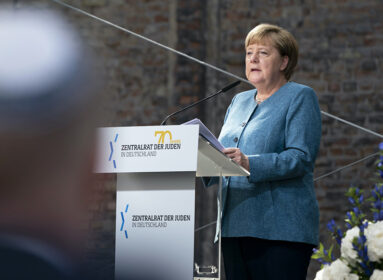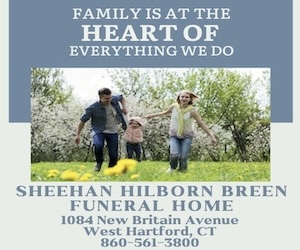
A pioneering Holocaust memorial is chronicled on film
By Cindy Mindell
 NEW HAVEN – World War II may have ended in Europe in 1945, but memorials to Holocaust victims would not appear in U.S. communities until three decades later. Among the first to be established on public land was the memorial in New Haven, planned and built by a unique communal partnership.
NEW HAVEN – World War II may have ended in Europe in 1945, but memorials to Holocaust victims would not appear in U.S. communities until three decades later. Among the first to be established on public land was the memorial in New Haven, planned and built by a unique communal partnership.
“This is a story of a whole community trusting and collaborating,” says Doris Zelinsky, who helped spearhead the project in 1976, when she was a staff member of then-New Haven Mayor Frank Logue. “City officials including Mayor Logue and the New Haven Department of Parks, Recreation and Trees, Holocaust survivors and their neighbors, and many Jewish and non-Jewish residents worked together to make something good emerge from the profound evil of the Holocaust.”
The 1977 ribbon-cutting in Edgewood Park on Whalley Avenue drew some 1,000 attendees and statewide media coverage.
A new documentary film chronicling the evolution and aftermath of the New Haven Holocaust Memorial will have its world premiere on Sunday, Nov. 15 at the Bow Tie Criterion Cinema in New Haven, introduced by New Haven Mayor Toni Harp and followed by a discussion with filmmaker Elena Neuman Lefkowitz.
The film, “People Forget… New Haven Remembers”, was commissioned and sponsored by Greater New Haven Holocaust Memory, Inc. (GNHHM), a volunteer nonprofit corporation dedicated to maintaining the memorial and creating educational programs related to the Holocaust. Zelinsky serves as the organization’s president.
People Forget… New Haven Remembers is built around the oral histories of four of the Holocaust survivors who resettled in New Haven after the war and who worked to make the memorial a reality: Dr. Ralph Friedman, Helene Rosenberg, Shifra Zamkov and Hannah Cooperstock.
“The story of how the memorial came to be is a saga of the determination of ordinary people,” says Fay Sheppard, a GNHHM director who became involved in the Greater New Haven Jewish community just as the memorial was being built and co-produced the film with Zelinsky. “Working together, they left a marker in our community. They remind all of us of the obligation to confront prejudice and hate.”
Logue promised Edgewood Park to a group of local survivors “on a handshake,” Zelinsky recalls. The survivors and their neighbors then raised private funds, going door to door, and motivated local artists and contractors to volunteer their time and talent, including architect Gus Franzoni, and Marvin Cohen, owner of Cheshire Nursery.
“While New Haven’s monument was the first Holocaust memorial built on public land in the country, not a dollar of public funds was used to build it,” Belinsky says.
The community rallied again in 2007 to clean up and repair the memorial, with New Haven architect Eric Epstein volunteering to oversee the refurbishment and to design a traveling exhibition about the memorial, “Memory and Legacy.” Since then, the audio-visual display of archival photographs and oral histories has been used as part of the New Haven Public Schools’ curriculum and shown at 35 locations around the state – from schools, colleges, and libraries to houses of worship, private businesses and government buildings.
Last year, Zelinsky approached Elena Neuman Lefkowitz, a 2003 Yale graduate and an independent filmmaker based in New York City whose company, NeumanFILMS, produces short films primarily for non-profit cultural and educational organizations.
“To many Americans, the Holocaust is ancient, if not forgotten, history, and in some quarters, Holocaust denial and dismissiveness is rampant,” says Lefkowitz. “The truth is the greatest weapon with which to counter the deniers, and with only a handful of survivors left to tell their stories, it is imperative that we create a historical record that will survive.”
Lefkowitz crafted the film for a middle school and high school student audience who may not know much about the Holocaust. That educational thrust is what especially drew her to the project.
“The film will enable students throughout Connecticut to learn about the Holocaust firsthand from men and women who were no older than they are today when Hitler marched across Europe,” she says. “It was important to me to make the film resonate with them personally, so that they would think, ‘This could have been me.’”
Lefkowitz begins the film by creating a portrait of normality in pre-war Jewish Poland, as told by the interviewees. Helene speaks of summer camps and hora dancing; Shifra talks about good relations with non-Jewish neighbors; Ralph describes a vibrant religious life before the war. The film then details the 1939 blitzkrieg, when the Nazis invaded Poland.
“We were lucky to find an invaluable piece of Nazi propaganda footage captured by American forces during the war, which now resides at the Library of Congress,” Lefkowitz says. “This footage visually illustrates the enormity of the German conquest and the fear it inspired.”
Individual stories of survival follow: hiding in barns, forced labor, partisan activity.
“None of the four survivors interviewed experienced concentration-camp internment,” Lefkowitz says. “Theirs is a story, less often told, of survival outside the camps in a state of constant threat and terror. The most poignant to me was Dr. Friedman’s description of living alone in the forest and sleeping in a hole he dug in the snow. The sheer isolation of his experience as a 13-year-old boy is haunting.”
The last part of the film moves from Poland to New Haven, where the four “protagonists” found sanctuary after the war. There, they would seek to memorialize their lost loved ones by raising money to build a Holocaust memorial on public land.
Lefkowitz says that the biggest challenge she encountered was keeping the film to 22 minutes – short enough for classroom use – and still telling the “extraordinary stories” of her four interviewees. “Each story in itself could have been a feature-length film,” she says.
In the end, she and Zelinsky decided to blend the four stories together.
“No one narrative is told in full, and, in fact, one of the most compelling stories – Helene Rosenberg’s survival as a Catholic nurse with false papers – had to be cut completely due to time constraints,” Lefkowitz says. “That was the most frustrating aspect of making this film – leaving so much captivating history untold and working hard to make sure that the shortened versions remained accurate and authentic. The highlight of making this film, of course, was meeting Ralph, Helene, Shifra, and Hannah and being entrusted to capture and safeguard their narratives for posterity. It was an awesome responsibility.”
After the Nov. 15 premiere, GNHMM plans to screen the film at high schools and colleges throughout Connecticut. An accompanying curriculum guide, written by four Connecticut high school teachers, will be distributed together with the film. In April, when the Jewish Federation of Greater New Haven serves as host community of the Jewish Federation Association of Connecticut’s Annual Connecticut Holocaust Commemoration Day in the State Senate Chambers, GNHMM hopes to screen the documentary and introduce the film’s interviewees. The organization is submitting the film to all Jewish film festivals and series throughout Connecticut in 2016 and to JNet, the Jewish Learning Network.
“This is an uplifting story of dedication and community action which draws attention to a moving and powerful public monument that I had passed so often when I was a student at Yale, yet never even noticed,” Lefkowitz says. “[This film] is one of the most satisfying projects I have ever worked on. It was both humbling and inspiring to bear witness to the histories of these four heroic individuals.”
“People Forget… New Haven Remembers” world premiere: Sunday, Nov. 15, 10 a.m. (doors open at 9:15 a.m.), Bow Tie Criterion Cinema, 86 Temple St., New Haven. Suggested donation: $5. For information: (203) 784-4123, (203) 623-6767.
KRISTALLNACHT COMMEMORATIONS
On the 27th of Cheshvan – which begins this year after sundown on the evening of Sunday, Nov. 8 – Jews around the world will mark the 77th anniversary of “Kristallnacht” – the “Night of Broken Glass” – which is viewed by historians as the beginning of the Holocaust. For a list of events that will be held around the state to commemorate this sad day in Jewish history please visit http://www.jewishledger.com/2015/11/kristallnacht-commemorations-2/








 Southern New England Jewish Ledger
Southern New England Jewish Ledger











